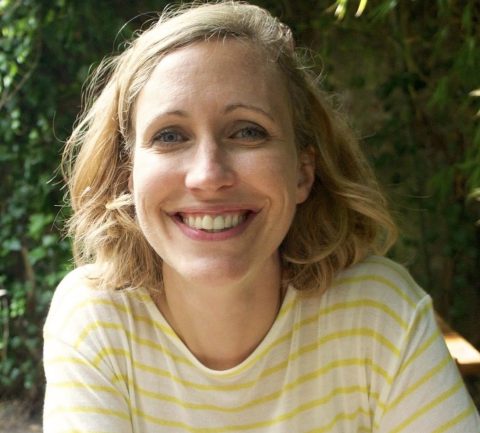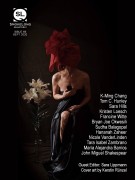I think you do a remarkable job of writing a character who is, at once, a beacon of her most admirable and repellent qualities. Was that your intention in writing her?
Thank you! What I wanted for this narrator, was, I think, the ability to be trapped in a cycle (bad relationships, in her case) at the same time she can take the forest-level view and see it all for what it is. It’s that weird point at which you know you’re repeating behaviors that aren’t good for you, but you’re still compelled to play into them anyway, because this time just might be different. I think we often sit at those kinds of crossroads, with lots of things. And she’s trying to reinvent herself, but somehow it all comes back to the same thing, again and again.
You taught me a new word: pheromonal. (I definitely thought, at first, that you’d misspelled phenomenal.) Why did you include this detail, that the queen’s chemical scent is part of the hive’s mourning process?
Ha, good point. I don’t think I’d ever used that word in a story before! Pheromones play a huge role in bee communication. I did use a little bit of artistic license, perhaps, because really, bees should know within hours if their queen is dead, as she’s not releasing any pheromones anymore. My understanding is that the workers do, though, need to know that she’s gone before they accept a new queen. And pheromones are how they know it.
Also, I think there’s an element of human relationships that’s essentially unknowable no matter how hard we try to make sense of it. There’s a chemistry to our behaviors and our attractions that’s very timeless but also very mysterious—to me, anyway. And there’s a tension in that, because we’re supposed to be so rational, but perhaps there’s a rationality in this as well that it’s hard for us to parse out sometimes.
Theoretical or not, I can’t help but wonder if a new queen has ever denied the hive and the cycle and flown away instead. Can you imagine it’s happened?
Hmm, good question; to be honest, I’m not sure. I’ve really only read that the workers might not accept the new queen. She does take mating flights, but only at the beginning and then, once she’s mated, she comes back to the hive and stays there for good unless she leads a swarm, in which case she leads the hive in moving to a new location. (There’s a whole other story in the swarm, which is an incredible and planned process.) A queen just flying away … I imagine it could be a glorious hour or two of seeing the world for her, no hive worries or accounting to anyone else, but it’d come at a cost—she’d likely be displaced forever. And that, I think, touches on the narrator’s fears in this story as well.
What experiences do you have with beekeeping off the page?
Sadly, none, though I do have beekeeping friends. The way bees emerged in this story was that I was reading War and Peace as part of A Public Space’s virtual book club with Yiyun Li this spring, and Tolstoy—who was a beekeeper—has this incredible passage where he compares a deserted Moscow to a dying beehive. It’s stunning, and it got me curious, so I started to do some research. And, it turns out, hive life is fascinating and complex and brutal, but also deeply logical and—if you were to apply a human lens to it—touching in its care and community. But still, if one queen is not working out for some reason, you kill her and make a new queen. And so on.
What’s been your greatest solace in quarantine?
I have these two shelter dogs that are at my side almost twenty-four hours a day, because I work from home. I go upstairs to put laundry away; they go upstairs to put laundry away. They hop on my chest the second I open my eyes each morning. It’s ridiculous. I’ve been terrible at training them, so they bark and beg for cheese and jump all over me (and only me, thank goodness), but they’re so full of joy and presence that I can’t help but laugh at them. That and seeing my kids find ways to adapt and cope—kids are so resilient. And reading and writing, definitely! I took a SmokeLong workshop early in quarantine, actually, and I was so grateful for the chance to put energy toward something other than my (considerable) anxiety.



 The core workshop of SmokeLong Fitness is all in writing, so you can take part from anywhere at anytime. We are excited about creating a supportive, consistent and structured environment for flash writers to work on their craft in a community. We are thrilled and proud to say that our workshop participants have won, placed, or been listed in every major flash competition. Community works.
The core workshop of SmokeLong Fitness is all in writing, so you can take part from anywhere at anytime. We are excited about creating a supportive, consistent and structured environment for flash writers to work on their craft in a community. We are thrilled and proud to say that our workshop participants have won, placed, or been listed in every major flash competition. Community works.